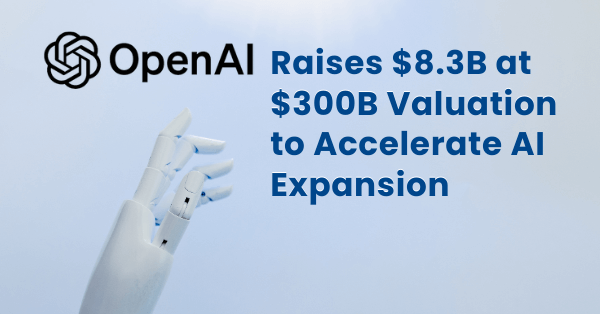OpenAI’s $8.3B Raise Moves Closer to $40B Capital Target
OpenAI, the creator of ChatGPT, has raised $8.3 billion in a funding round that now values the company at $300 billion. According to reports from The New York Times and The Information, the latest raise is part of OpenAI’s broader strategy to secure $40 billion in capital by the end of 2025.
This latest investment comes just months after OpenAI secured $2.5 billion in March, kicking off the first phase of the campaign. Originally, the company planned to raise the remaining $7.5 billion by year-end—but growing investor interest pushed the round to close far ahead of schedule.
Dragoneer Leads with $2.8B Check, Strategic Backers Take Priority
The round was led by Dragoneer Investment Group, which contributed $2.8 billion. Other new strategic investors include private equity firms Blackstone and TPG, along with mutual fund manager T. Rowe Price. Notably, prominent VC firms such as Andreessen Horowitz, Sequoia Capital, Tiger Global, Thrive Capital, Fidelity, Coatue Management, Altimeter Capital, and Founders Fund also participated.
The investment strategy this time leaned toward new capital partners, which meant smaller allocations for some early backers. This shift signals OpenAI’s intent to align with institutional investors who can provide more than just funding—such as infrastructure, strategic guidance, and potential IPO pathways.
ChatGPT Revenue Surge and User Growth Drive Investor Optimism
The oversubscribed round reflects confidence in OpenAI’s revenue trajectory. According to The Information, the company recently hit $12 billion in annualized revenue. The New York Times suggests the figure is even higher—closer to $13 billion—with expectations to reach $20 billion by the end of 2025.
Additionally, ChatGPT now reportedly serves over 700 million weekly active users. This surge in adoption places OpenAI among the most actively used digital platforms globally, alongside major consumer tech products.
AI Infrastructure Investments Drive OpenAI’s Next Phase
Much of the new funding is expected to go toward expanding AI infrastructure. OpenAI is rumored to be in talks with Microsoft and Oracle to bolster its compute capacity through enhanced data center partnerships.
This infrastructure investment is essential for powering the large-scale deployment of OpenAI’s models across industries. From telecom to financial services and healthcare, demand for foundational AI continues to scale.
SoftBank and Microsoft Deepen Ties with OpenAI
Earlier in the year, SoftBank took a 2.77% stake in OpenAI as part of the initial $2.5 billion round. The Japanese investment firm is expected to play a larger role in OpenAI’s ecosystem as it looks to commercialize AI across sectors ranging from semiconductors to automation.
Meanwhile, Microsoft, a longtime OpenAI partner, is reportedly engaged in ongoing discussions that could influence OpenAI’s for-profit strategy. These talks may pave the way for deeper product integrations or even equity restructuring ahead of a possible IPO.
IPO Rumors and Institutional Confidence in AI
The scale and structure of the $8.3 billion round have reignited speculation that OpenAI could pursue a public listing in the near future. Although no official plans have been announced, analysts view this fundraising milestone as a strategic step toward becoming a true for-profit enterprise.
The deal also highlights a broader shift in venture capital and institutional investment. Traditional VCs are now sharing the AI space with major private equity and mutual fund players, marking a new phase of maturity for foundational AI.
OpenAI Funding Sets New Benchmark for AI Investment Landscape
OpenAI’s rapid capital raise reinforces the industry’s confidence in AI as a long-term economic driver. As companies race to embed AI into their products and workflows, foundational model providers like OpenAI are positioned to capture a significant share of value.
This funding round sets a new benchmark not just for OpenAI, but for the broader AI investment landscape. As the company scales globally, it will likely play a central role in shaping future standards for data ethics, security, and AI model transparency.
What’s Next for OpenAI: Expansion, Monetization & Market Power
With $8.3 billion in fresh capital and a $300 billion valuation, OpenAI has entered a critical phase of expansion. The company is expected to accelerate its monetization strategies, deepen partnerships, and invest in the infrastructure required to support enterprise-grade AI applications.
This new funding also adds weight to OpenAI’s role as a global AI standard bearer, with the potential to influence policy, set platform norms, and steer next-gen development in language models and GenAI.
If OpenAI reaches its $40 billion funding target by year-end, it could become the most capitalized AI company in history—cementing its leadership in a sector that is rapidly reshaping how industries, governments, and consumers engage with technology.


























